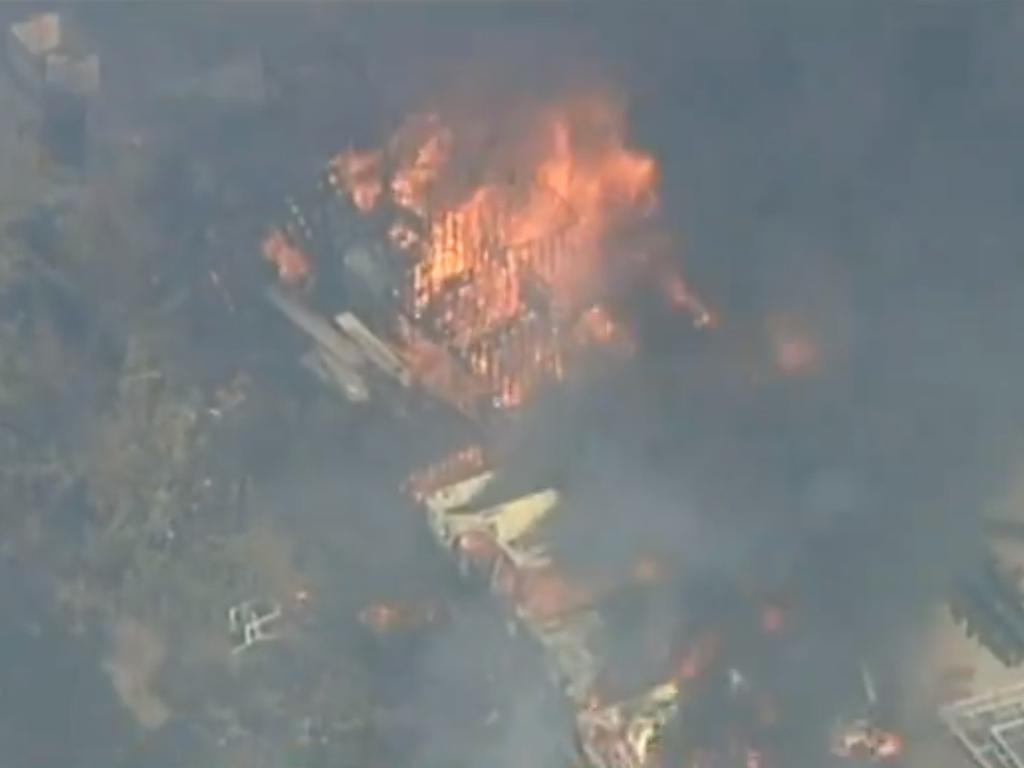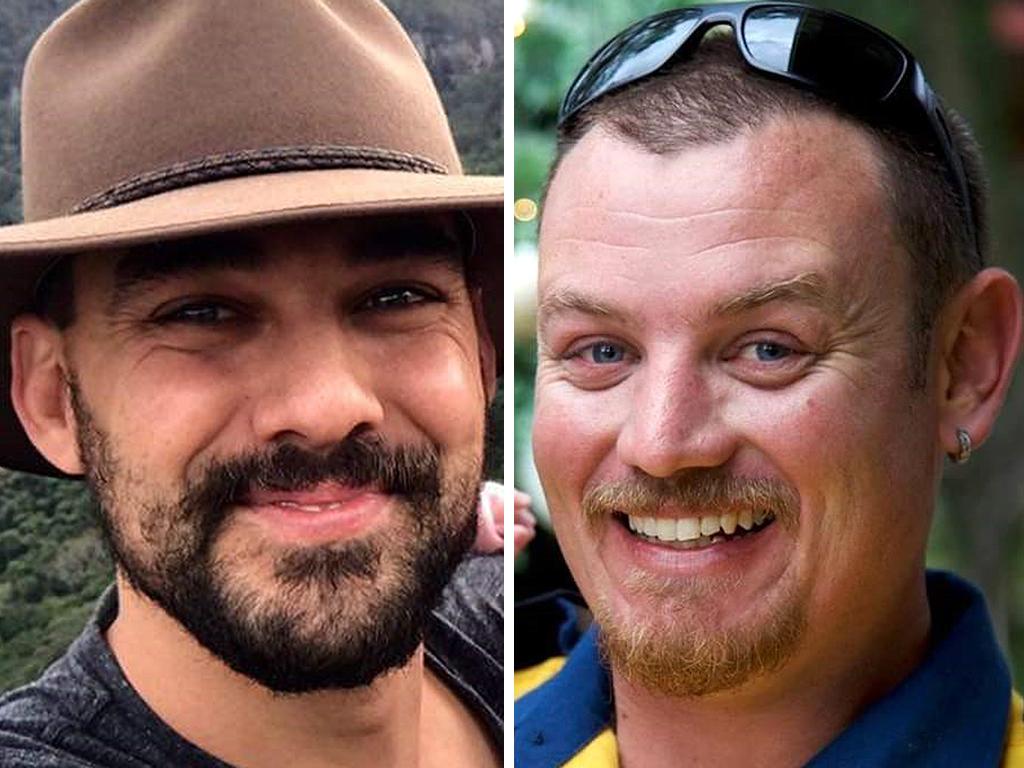
One thing I can tell you is I am heartily sick of listening to people who live in climate-controlled comfort in Paddington or Marrickville bickering about the cause of fires.
Around here, we don’t fret too much on how or why a fire started. We just know it is there. We know it is there because last night we could see it, a red glow on the horizon to the north west. And we know it by name now, the Green Wattle Creek Fire, the fire that tore through the communities of Buxton, Balmoral and Bargo yesterday, leaving an estimated 40 homes razed and two RFS volunteers dead with another two seriously injured.
On Wednesday I called into the local RFS depot. I dropped in a few cases of bottled water, a case of Coke and a bag of snacks. The depot was half full of donated goods of like kind. My modest gift seemed superfluous but the fireys were cheerfully grateful anyway.
I had a brief chat to the deputy fire chief of the area. He’s just built a home around the corner from my place.
We discussed the fire and the haze that hung funereally around the township. I asked if the smoke came from a backburn away to the north.
“No, mate. It’s the big one. We’re just trying to get some black ground between it and us.”
The big one he was referring to is the fire that has now destroyed 167,000 hectares and counting to Sydney’s south west.
He gave me a few tips on putting out spot fires. Ember showers can fly up to 20 kilometres ahead of a fire front, creating what the NSW RFS calls “erratic fire behaviour”, casting the fire itself with almost animate properties, a mad, schizophrenic, uncontrollable beast.
In country towns no one is held in higher esteem than RFS volunteers. Teachers, coppers, retired politicians, captains of industry (shake a tree around here and one or two are bound to fall out) all play second fiddle to the RFS ‘vollies’.
These are our heroes. This season, if we still have something called a fire season in this country, they’ve been fighting fires for months.

This week’s ideologically driven fixation has been the brouhaha about Scott Morrison’s absence while he took a holiday. He cut his holiday short today, apologising for his absence.
I don’t think an apology is necessary. Morrison has no operational role. To be honest, having one politician in NSW RFS Operations Centre, wandering about stumbling into things is more than enough and it doesn’t really matter whether it is the PM or his deputy. Politicians know better than you or me, that beyond reinforcing the advice of RFS Command in pressers, they are taking up valuable space and time.
The real question, is why do our governments – state and federal — treat fire-fighting volunteers so badly?
In NSW, there are numerous stories of equipment shortages and equipment failures especially in respiratory aids. Dual cartridge respirators are in short supply. The NSW RFS had its funding cut in the state budget. there is bickering over the extent of the cuts.
Fire-fighting volunteers have to go to their own pockets, spending on average around $2000 of their own money to equip themselves properly. They might get a fraction of that back on their tax returns if they can prove the purchases have been made.
In terms of tax breaks or concessions they get zip. Nada. Nothing.
Fire-fighting volunteers in Australia make up the largest volunteer fire fighting unit in the world. Talk to them and you will quickly discover they revel in their volunteer status. They don’t want a quid out of it or become ‘professionalised’ as politicians describe it.
Politicians conflate. That’s what they do, and the idea that volunteer brigades should be better funded and members enjoy some tax relief is a conflation of the professionalism argument. The fact is our fire-fighting volunteers are working longer and harder than ever before and at the expense of their personal incomes. Tax breaks or some form of tax relief from the Commonwealth is something that shouldn’t be subject to political prevarications.
It’s not as if this is a brand spanking new issue either. Governments state and federal have been ruminating over this for two decades or more. In 2003, a report to the federal parliament recommended “the Commonwealth consider the feasibility of taxation relief on costs incurred by registered firefighting volunteers in the line of duty.”

A literal library of reports, papers and studies have made similar recommendations over the last ten years, making a range of specific and generalised proposals including compensation by way of tax relief be extended to employers of fire-fighting volunteers.
In 2010, Tony Abbott, himself an RFS volunteer, suggested that $10 per hour be taken off vollies’ HECS debts, as a means both of compensating students who were with volunteer fire services as well as encouraging new, young volunteers to join up.
In the wake of Black Saturday fires in Victoria, the state government introduced a property levy to override the existing insurance levy to fund both the paid Metropolitan Fire Brigades and the volunteer Country Fire Authority. A recommendation still sits on the table to exclude CFA volunteers from the levy on the sound logical ground that the volunteers will be paying for a service they are providing for nothing.
Precisely none of these recommendations have been adopted. Not one.
It seems federal governments have assiduously followed the advice of the Australian Taxation Office who regard the notion of tax relief or PAYG compensation for volunteers as too difficult for its delicate bureaucratic mechanisms to handle.

The argument is one of the horrific thin edge of the wedge type. If the ATO extends some tax relief to fire-fighting volunteers, who knows where it will end? Other volunteer groups will expect the same. A nation of volunteers who perform community services that would otherwise have to be taxpayer funded having a few cents in the dollar knocked off their taxable income. How awful.
The ATO regards any concession as anathema, too hard and too complicated for what would essentially be a data collection exercise.
Governments who direct the ATO and legislate tax law from Howard to Rudd, Gillard, Abbot, Turnbull and now Morrison have done precisely nothing, too, despite the fact they know or should know that fire-fighting volunteers are now offering their services for longer periods of time in conditions that are more onerous and more likely to lead to loss of income.
Our fire-fighting volunteers are heroes. This morning we roused to learn just how dangerous their jobs can be. We know, too, that in the Green Wattle Creek Fire, volunteers fought to save houses knowing their own homes were at risk. It is the sort of devotion that money can’t buy.
Many have come home exhausted, covered in ash and soot to receive tax notices. Having coughed up a sizeable chunk of their personal incomes in volunteering to fight fires, putting their lives on the line, they are left to peruse grim correspondence asking them to call the ATO “urgently to avoid further action.”
We should be angry about that. Instead we wallow in partisan obsessions. The notion that a bushfire is an ideological construct – with blame angrily apportioned across the political spectrum is a symptom of what is going seriously wrong in this country.
But if you want to really know what’s wrong with this country, it’s rotting from the top down.







I live in a fire zone. I am just one of hundreds of thousands of people in Australia who are and who have been living with its contingent anxieties for weeks now.